Emotional Intelligence - Part 11: Definition, Model and Dimensions
VerifiedAdded on 2021/02/20
|15
|4465
|166
AI Summary
Role play: Emotions in decision making and effect on other 11 CONCLUSION 11 REFERENCES 12 INTRODUCTION Emotional intelligence refer to ability of a person to identify and manage own emotions as well as other emotions also (Emotional intelligence refer to ability of a person to identify and manage own emotions as well as other emotions also (Agrawal, Gans and Goldfarb, 2017). Emotional intelligence can be develop though various ways such as practice self awareness, channelizing emotions, self motivation, creating healthier relationships
Contribute Materials
Your contribution can guide someone’s learning journey. Share your
documents today.
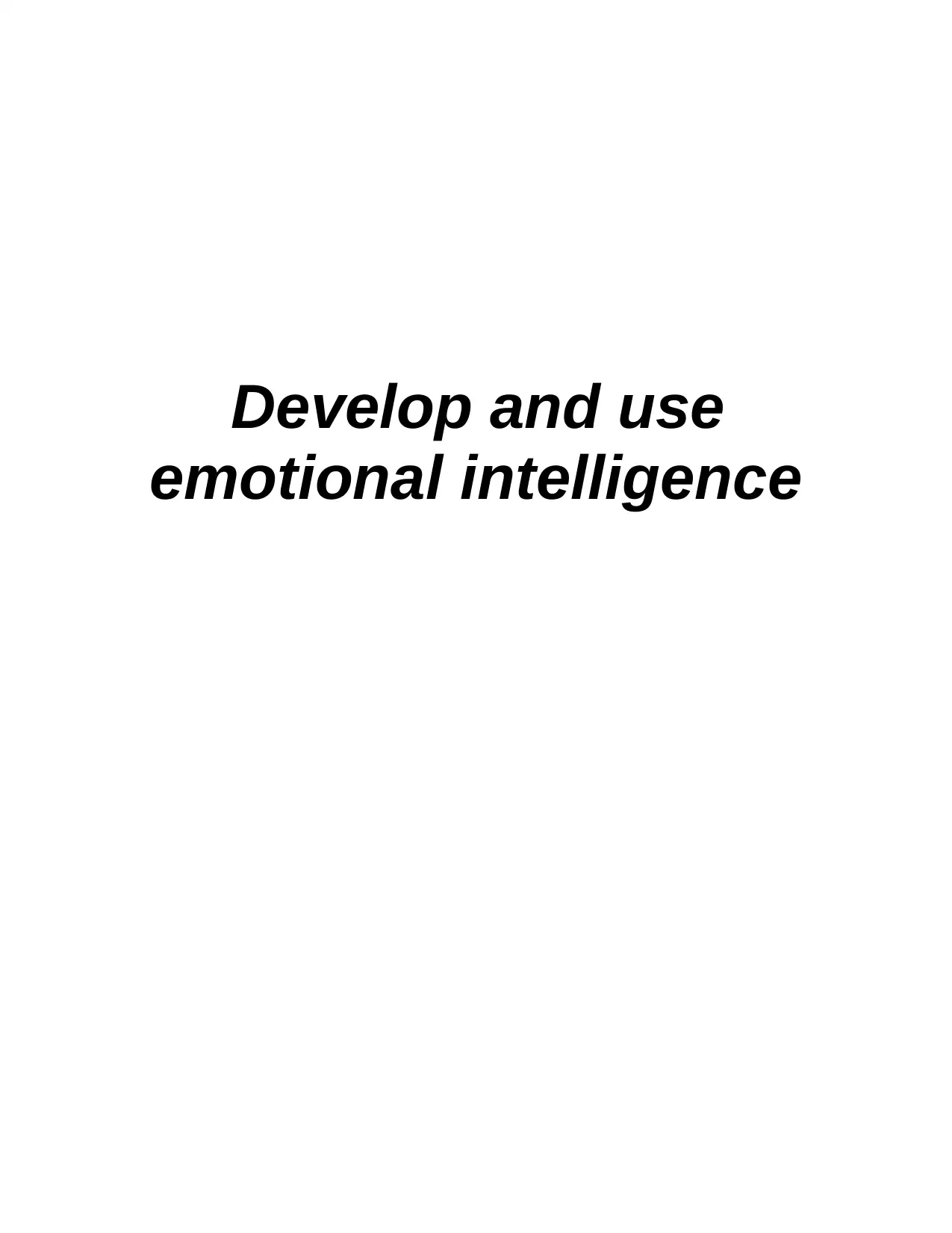
Develop and use
emotional intelligence
emotional intelligence
Secure Best Marks with AI Grader
Need help grading? Try our AI Grader for instant feedback on your assignments.
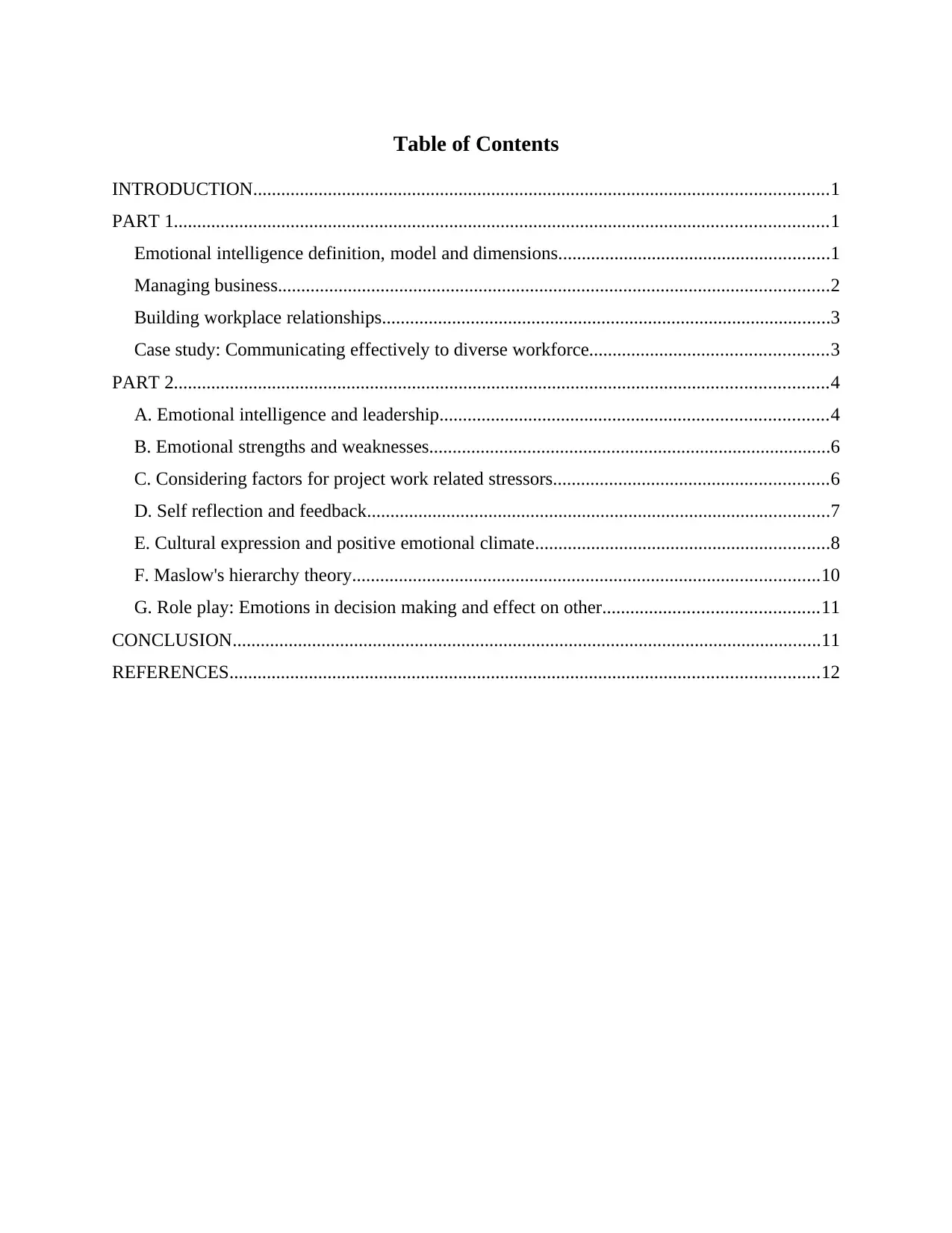
Table of Contents
INTRODUCTION...........................................................................................................................1
PART 1............................................................................................................................................1
Emotional intelligence definition, model and dimensions..........................................................1
Managing business......................................................................................................................2
Building workplace relationships................................................................................................3
Case study: Communicating effectively to diverse workforce...................................................3
PART 2............................................................................................................................................4
A. Emotional intelligence and leadership...................................................................................4
B. Emotional strengths and weaknesses......................................................................................6
C. Considering factors for project work related stressors...........................................................6
D. Self reflection and feedback...................................................................................................7
E. Cultural expression and positive emotional climate...............................................................8
F. Maslow's hierarchy theory....................................................................................................10
G. Role play: Emotions in decision making and effect on other..............................................11
CONCLUSION..............................................................................................................................11
REFERENCES..............................................................................................................................12
INTRODUCTION...........................................................................................................................1
PART 1............................................................................................................................................1
Emotional intelligence definition, model and dimensions..........................................................1
Managing business......................................................................................................................2
Building workplace relationships................................................................................................3
Case study: Communicating effectively to diverse workforce...................................................3
PART 2............................................................................................................................................4
A. Emotional intelligence and leadership...................................................................................4
B. Emotional strengths and weaknesses......................................................................................6
C. Considering factors for project work related stressors...........................................................6
D. Self reflection and feedback...................................................................................................7
E. Cultural expression and positive emotional climate...............................................................8
F. Maslow's hierarchy theory....................................................................................................10
G. Role play: Emotions in decision making and effect on other..............................................11
CONCLUSION..............................................................................................................................11
REFERENCES..............................................................................................................................12

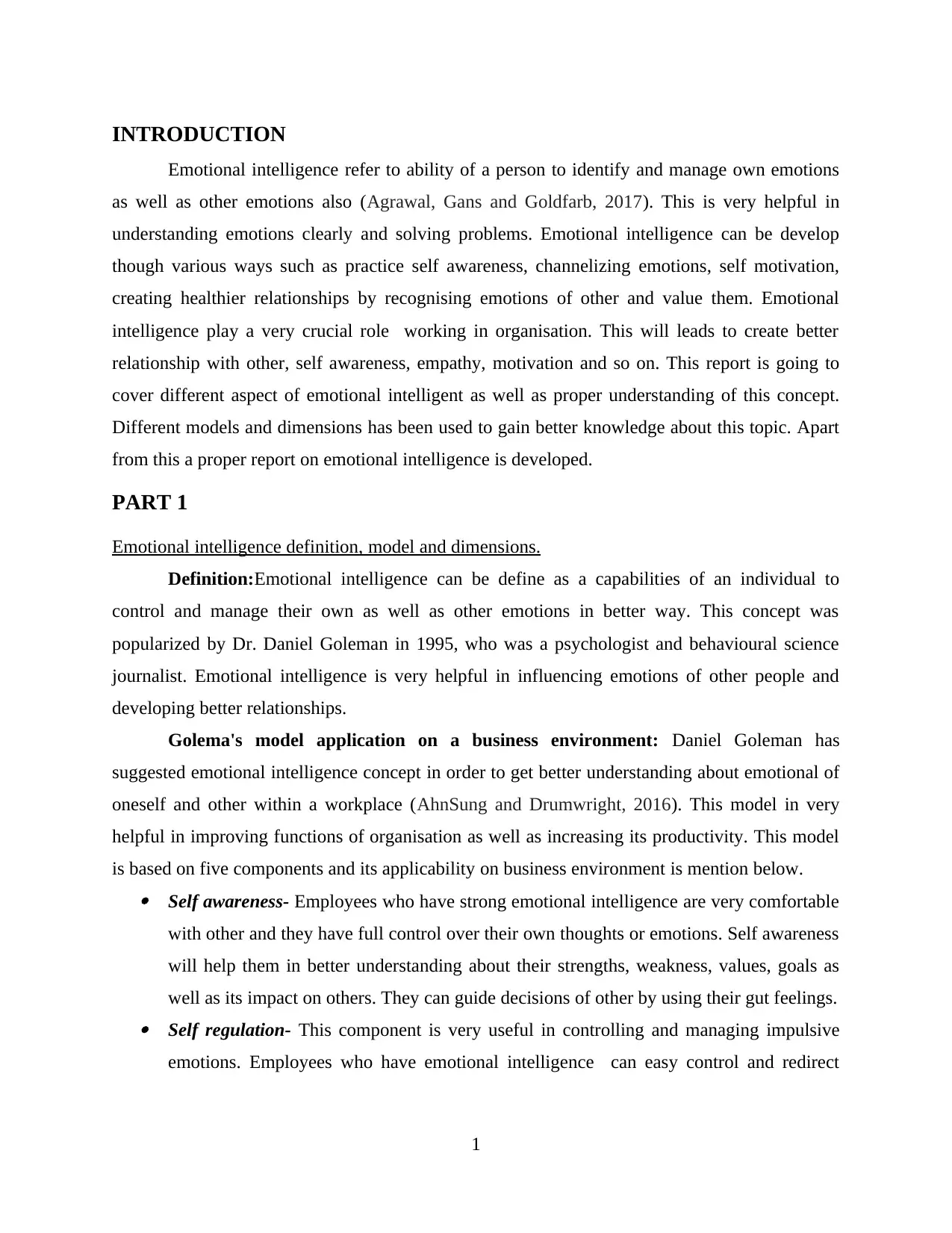
INTRODUCTION
Emotional intelligence refer to ability of a person to identify and manage own emotions
as well as other emotions also (Agrawal, Gans and Goldfarb, 2017). This is very helpful in
understanding emotions clearly and solving problems. Emotional intelligence can be develop
though various ways such as practice self awareness, channelizing emotions, self motivation,
creating healthier relationships by recognising emotions of other and value them. Emotional
intelligence play a very crucial role working in organisation. This will leads to create better
relationship with other, self awareness, empathy, motivation and so on. This report is going to
cover different aspect of emotional intelligent as well as proper understanding of this concept.
Different models and dimensions has been used to gain better knowledge about this topic. Apart
from this a proper report on emotional intelligence is developed.
PART 1
Emotional intelligence definition, model and dimensions.
Definition:Emotional intelligence can be define as a capabilities of an individual to
control and manage their own as well as other emotions in better way. This concept was
popularized by Dr. Daniel Goleman in 1995, who was a psychologist and behavioural science
journalist. Emotional intelligence is very helpful in influencing emotions of other people and
developing better relationships.
Golema's model application on a business environment: Daniel Goleman has
suggested emotional intelligence concept in order to get better understanding about emotional of
oneself and other within a workplace (AhnSung and Drumwright, 2016). This model in very
helpful in improving functions of organisation as well as increasing its productivity. This model
is based on five components and its applicability on business environment is mention below. Self awareness- Employees who have strong emotional intelligence are very comfortable
with other and they have full control over their own thoughts or emotions. Self awareness
will help them in better understanding about their strengths, weakness, values, goals as
well as its impact on others. They can guide decisions of other by using their gut feelings. Self regulation- This component is very useful in controlling and managing impulsive
emotions. Employees who have emotional intelligence can easy control and redirect
1
Emotional intelligence refer to ability of a person to identify and manage own emotions
as well as other emotions also (Agrawal, Gans and Goldfarb, 2017). This is very helpful in
understanding emotions clearly and solving problems. Emotional intelligence can be develop
though various ways such as practice self awareness, channelizing emotions, self motivation,
creating healthier relationships by recognising emotions of other and value them. Emotional
intelligence play a very crucial role working in organisation. This will leads to create better
relationship with other, self awareness, empathy, motivation and so on. This report is going to
cover different aspect of emotional intelligent as well as proper understanding of this concept.
Different models and dimensions has been used to gain better knowledge about this topic. Apart
from this a proper report on emotional intelligence is developed.
PART 1
Emotional intelligence definition, model and dimensions.
Definition:Emotional intelligence can be define as a capabilities of an individual to
control and manage their own as well as other emotions in better way. This concept was
popularized by Dr. Daniel Goleman in 1995, who was a psychologist and behavioural science
journalist. Emotional intelligence is very helpful in influencing emotions of other people and
developing better relationships.
Golema's model application on a business environment: Daniel Goleman has
suggested emotional intelligence concept in order to get better understanding about emotional of
oneself and other within a workplace (AhnSung and Drumwright, 2016). This model in very
helpful in improving functions of organisation as well as increasing its productivity. This model
is based on five components and its applicability on business environment is mention below. Self awareness- Employees who have strong emotional intelligence are very comfortable
with other and they have full control over their own thoughts or emotions. Self awareness
will help them in better understanding about their strengths, weakness, values, goals as
well as its impact on others. They can guide decisions of other by using their gut feelings. Self regulation- This component is very useful in controlling and managing impulsive
emotions. Employees who have emotional intelligence can easy control and redirect
1
Secure Best Marks with AI Grader
Need help grading? Try our AI Grader for instant feedback on your assignments.
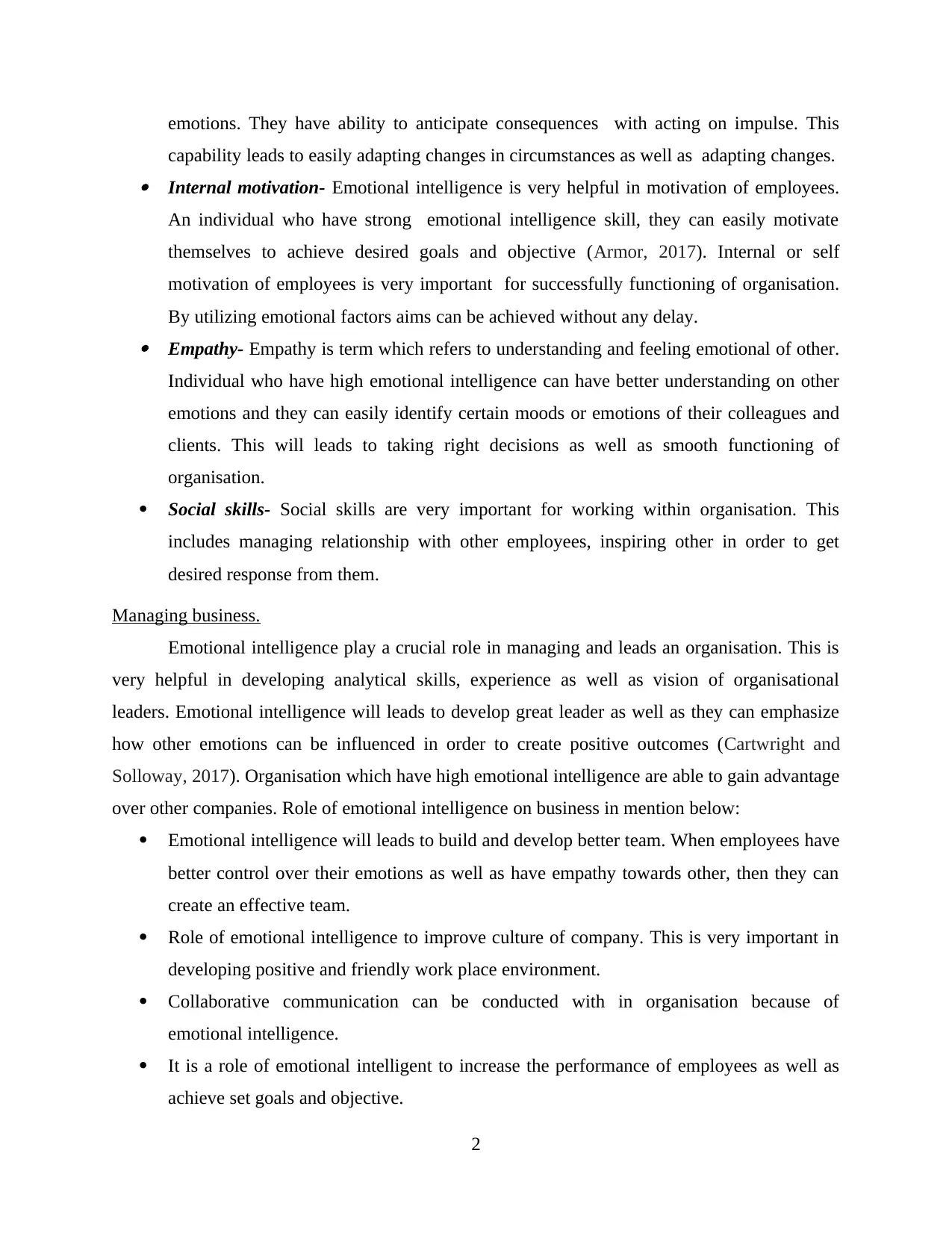
emotions. They have ability to anticipate consequences with acting on impulse. This
capability leads to easily adapting changes in circumstances as well as adapting changes. Internal motivation- Emotional intelligence is very helpful in motivation of employees.
An individual who have strong emotional intelligence skill, they can easily motivate
themselves to achieve desired goals and objective (Armor, 2017). Internal or self
motivation of employees is very important for successfully functioning of organisation.
By utilizing emotional factors aims can be achieved without any delay. Empathy- Empathy is term which refers to understanding and feeling emotional of other.
Individual who have high emotional intelligence can have better understanding on other
emotions and they can easily identify certain moods or emotions of their colleagues and
clients. This will leads to taking right decisions as well as smooth functioning of
organisation.
Social skills- Social skills are very important for working within organisation. This
includes managing relationship with other employees, inspiring other in order to get
desired response from them.
Managing business.
Emotional intelligence play a crucial role in managing and leads an organisation. This is
very helpful in developing analytical skills, experience as well as vision of organisational
leaders. Emotional intelligence will leads to develop great leader as well as they can emphasize
how other emotions can be influenced in order to create positive outcomes (Cartwright and
Solloway, 2017). Organisation which have high emotional intelligence are able to gain advantage
over other companies. Role of emotional intelligence on business in mention below:
Emotional intelligence will leads to build and develop better team. When employees have
better control over their emotions as well as have empathy towards other, then they can
create an effective team.
Role of emotional intelligence to improve culture of company. This is very important in
developing positive and friendly work place environment.
Collaborative communication can be conducted with in organisation because of
emotional intelligence.
It is a role of emotional intelligent to increase the performance of employees as well as
achieve set goals and objective.
2
capability leads to easily adapting changes in circumstances as well as adapting changes. Internal motivation- Emotional intelligence is very helpful in motivation of employees.
An individual who have strong emotional intelligence skill, they can easily motivate
themselves to achieve desired goals and objective (Armor, 2017). Internal or self
motivation of employees is very important for successfully functioning of organisation.
By utilizing emotional factors aims can be achieved without any delay. Empathy- Empathy is term which refers to understanding and feeling emotional of other.
Individual who have high emotional intelligence can have better understanding on other
emotions and they can easily identify certain moods or emotions of their colleagues and
clients. This will leads to taking right decisions as well as smooth functioning of
organisation.
Social skills- Social skills are very important for working within organisation. This
includes managing relationship with other employees, inspiring other in order to get
desired response from them.
Managing business.
Emotional intelligence play a crucial role in managing and leads an organisation. This is
very helpful in developing analytical skills, experience as well as vision of organisational
leaders. Emotional intelligence will leads to develop great leader as well as they can emphasize
how other emotions can be influenced in order to create positive outcomes (Cartwright and
Solloway, 2017). Organisation which have high emotional intelligence are able to gain advantage
over other companies. Role of emotional intelligence on business in mention below:
Emotional intelligence will leads to build and develop better team. When employees have
better control over their emotions as well as have empathy towards other, then they can
create an effective team.
Role of emotional intelligence to improve culture of company. This is very important in
developing positive and friendly work place environment.
Collaborative communication can be conducted with in organisation because of
emotional intelligence.
It is a role of emotional intelligent to increase the performance of employees as well as
achieve set goals and objective.
2
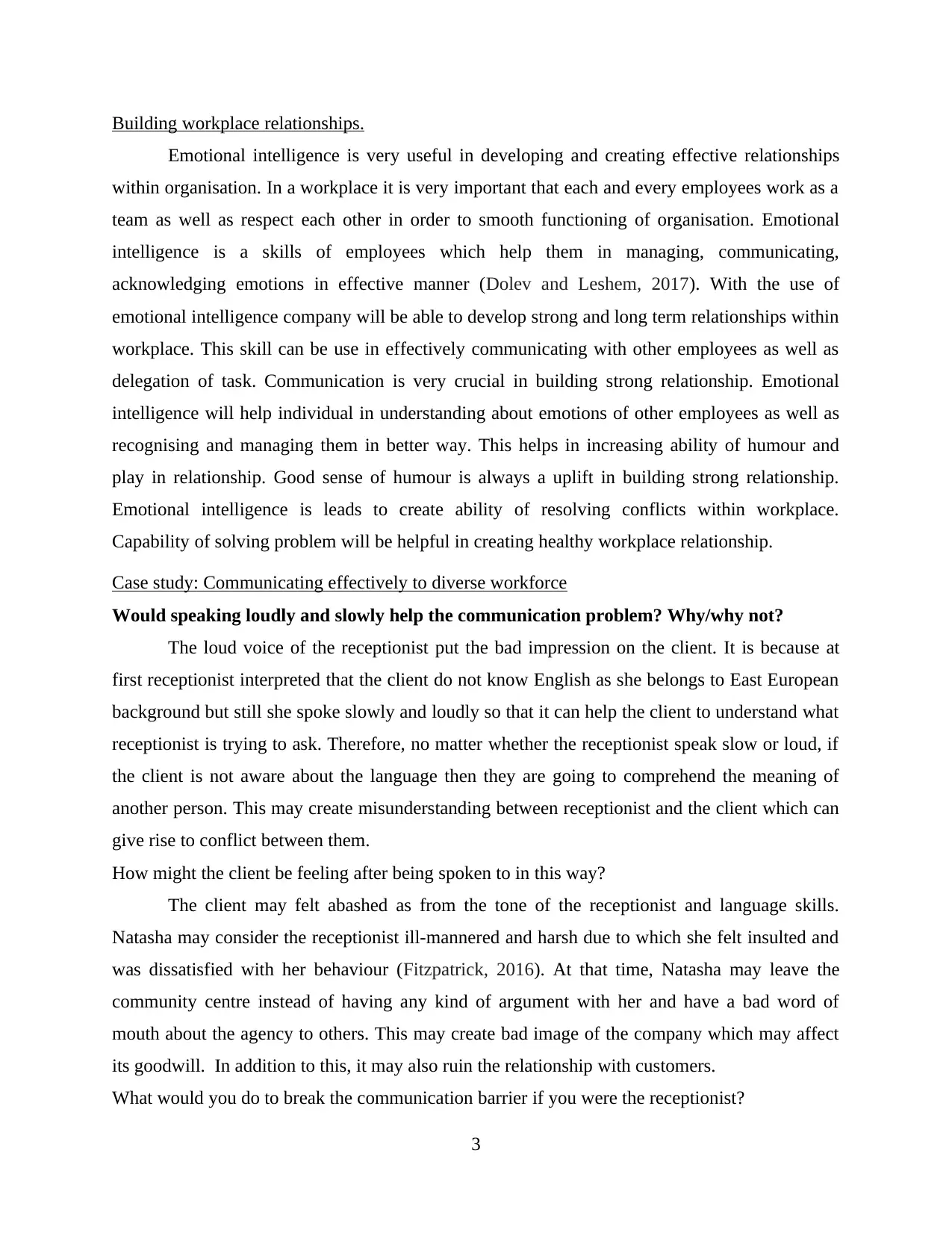
Building workplace relationships.
Emotional intelligence is very useful in developing and creating effective relationships
within organisation. In a workplace it is very important that each and every employees work as a
team as well as respect each other in order to smooth functioning of organisation. Emotional
intelligence is a skills of employees which help them in managing, communicating,
acknowledging emotions in effective manner (Dolev and Leshem, 2017). With the use of
emotional intelligence company will be able to develop strong and long term relationships within
workplace. This skill can be use in effectively communicating with other employees as well as
delegation of task. Communication is very crucial in building strong relationship. Emotional
intelligence will help individual in understanding about emotions of other employees as well as
recognising and managing them in better way. This helps in increasing ability of humour and
play in relationship. Good sense of humour is always a uplift in building strong relationship.
Emotional intelligence is leads to create ability of resolving conflicts within workplace.
Capability of solving problem will be helpful in creating healthy workplace relationship.
Case study: Communicating effectively to diverse workforce
Would speaking loudly and slowly help the communication problem? Why/why not?
The loud voice of the receptionist put the bad impression on the client. It is because at
first receptionist interpreted that the client do not know English as she belongs to East European
background but still she spoke slowly and loudly so that it can help the client to understand what
receptionist is trying to ask. Therefore, no matter whether the receptionist speak slow or loud, if
the client is not aware about the language then they are going to comprehend the meaning of
another person. This may create misunderstanding between receptionist and the client which can
give rise to conflict between them.
How might the client be feeling after being spoken to in this way?
The client may felt abashed as from the tone of the receptionist and language skills.
Natasha may consider the receptionist ill-mannered and harsh due to which she felt insulted and
was dissatisfied with her behaviour (Fitzpatrick, 2016). At that time, Natasha may leave the
community centre instead of having any kind of argument with her and have a bad word of
mouth about the agency to others. This may create bad image of the company which may affect
its goodwill. In addition to this, it may also ruin the relationship with customers.
What would you do to break the communication barrier if you were the receptionist?
3
Emotional intelligence is very useful in developing and creating effective relationships
within organisation. In a workplace it is very important that each and every employees work as a
team as well as respect each other in order to smooth functioning of organisation. Emotional
intelligence is a skills of employees which help them in managing, communicating,
acknowledging emotions in effective manner (Dolev and Leshem, 2017). With the use of
emotional intelligence company will be able to develop strong and long term relationships within
workplace. This skill can be use in effectively communicating with other employees as well as
delegation of task. Communication is very crucial in building strong relationship. Emotional
intelligence will help individual in understanding about emotions of other employees as well as
recognising and managing them in better way. This helps in increasing ability of humour and
play in relationship. Good sense of humour is always a uplift in building strong relationship.
Emotional intelligence is leads to create ability of resolving conflicts within workplace.
Capability of solving problem will be helpful in creating healthy workplace relationship.
Case study: Communicating effectively to diverse workforce
Would speaking loudly and slowly help the communication problem? Why/why not?
The loud voice of the receptionist put the bad impression on the client. It is because at
first receptionist interpreted that the client do not know English as she belongs to East European
background but still she spoke slowly and loudly so that it can help the client to understand what
receptionist is trying to ask. Therefore, no matter whether the receptionist speak slow or loud, if
the client is not aware about the language then they are going to comprehend the meaning of
another person. This may create misunderstanding between receptionist and the client which can
give rise to conflict between them.
How might the client be feeling after being spoken to in this way?
The client may felt abashed as from the tone of the receptionist and language skills.
Natasha may consider the receptionist ill-mannered and harsh due to which she felt insulted and
was dissatisfied with her behaviour (Fitzpatrick, 2016). At that time, Natasha may leave the
community centre instead of having any kind of argument with her and have a bad word of
mouth about the agency to others. This may create bad image of the company which may affect
its goodwill. In addition to this, it may also ruin the relationship with customers.
What would you do to break the communication barrier if you were the receptionist?
3
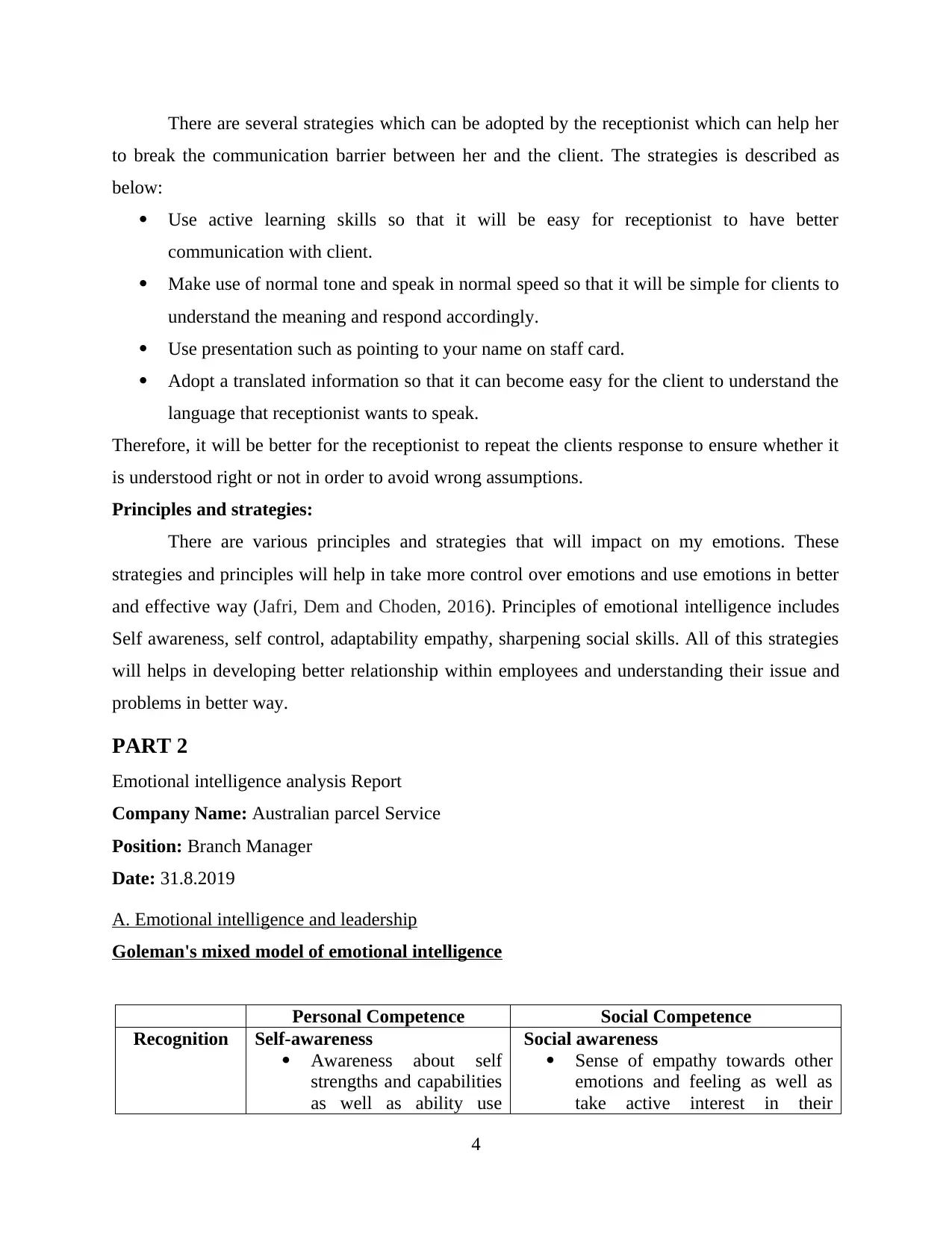
There are several strategies which can be adopted by the receptionist which can help her
to break the communication barrier between her and the client. The strategies is described as
below:
Use active learning skills so that it will be easy for receptionist to have better
communication with client.
Make use of normal tone and speak in normal speed so that it will be simple for clients to
understand the meaning and respond accordingly.
Use presentation such as pointing to your name on staff card.
Adopt a translated information so that it can become easy for the client to understand the
language that receptionist wants to speak.
Therefore, it will be better for the receptionist to repeat the clients response to ensure whether it
is understood right or not in order to avoid wrong assumptions.
Principles and strategies:
There are various principles and strategies that will impact on my emotions. These
strategies and principles will help in take more control over emotions and use emotions in better
and effective way (Jafri, Dem and Choden, 2016). Principles of emotional intelligence includes
Self awareness, self control, adaptability empathy, sharpening social skills. All of this strategies
will helps in developing better relationship within employees and understanding their issue and
problems in better way.
PART 2
Emotional intelligence analysis Report
Company Name: Australian parcel Service
Position: Branch Manager
Date: 31.8.2019
A. Emotional intelligence and leadership
Goleman's mixed model of emotional intelligence
Personal Competence Social Competence
Recognition Self-awareness
Awareness about self
strengths and capabilities
as well as ability use
Social awareness
Sense of empathy towards other
emotions and feeling as well as
take active interest in their
4
to break the communication barrier between her and the client. The strategies is described as
below:
Use active learning skills so that it will be easy for receptionist to have better
communication with client.
Make use of normal tone and speak in normal speed so that it will be simple for clients to
understand the meaning and respond accordingly.
Use presentation such as pointing to your name on staff card.
Adopt a translated information so that it can become easy for the client to understand the
language that receptionist wants to speak.
Therefore, it will be better for the receptionist to repeat the clients response to ensure whether it
is understood right or not in order to avoid wrong assumptions.
Principles and strategies:
There are various principles and strategies that will impact on my emotions. These
strategies and principles will help in take more control over emotions and use emotions in better
and effective way (Jafri, Dem and Choden, 2016). Principles of emotional intelligence includes
Self awareness, self control, adaptability empathy, sharpening social skills. All of this strategies
will helps in developing better relationship within employees and understanding their issue and
problems in better way.
PART 2
Emotional intelligence analysis Report
Company Name: Australian parcel Service
Position: Branch Manager
Date: 31.8.2019
A. Emotional intelligence and leadership
Goleman's mixed model of emotional intelligence
Personal Competence Social Competence
Recognition Self-awareness
Awareness about self
strengths and capabilities
as well as ability use
Social awareness
Sense of empathy towards other
emotions and feeling as well as
take active interest in their
4
Paraphrase This Document
Need a fresh take? Get an instant paraphrase of this document with our AI Paraphraser
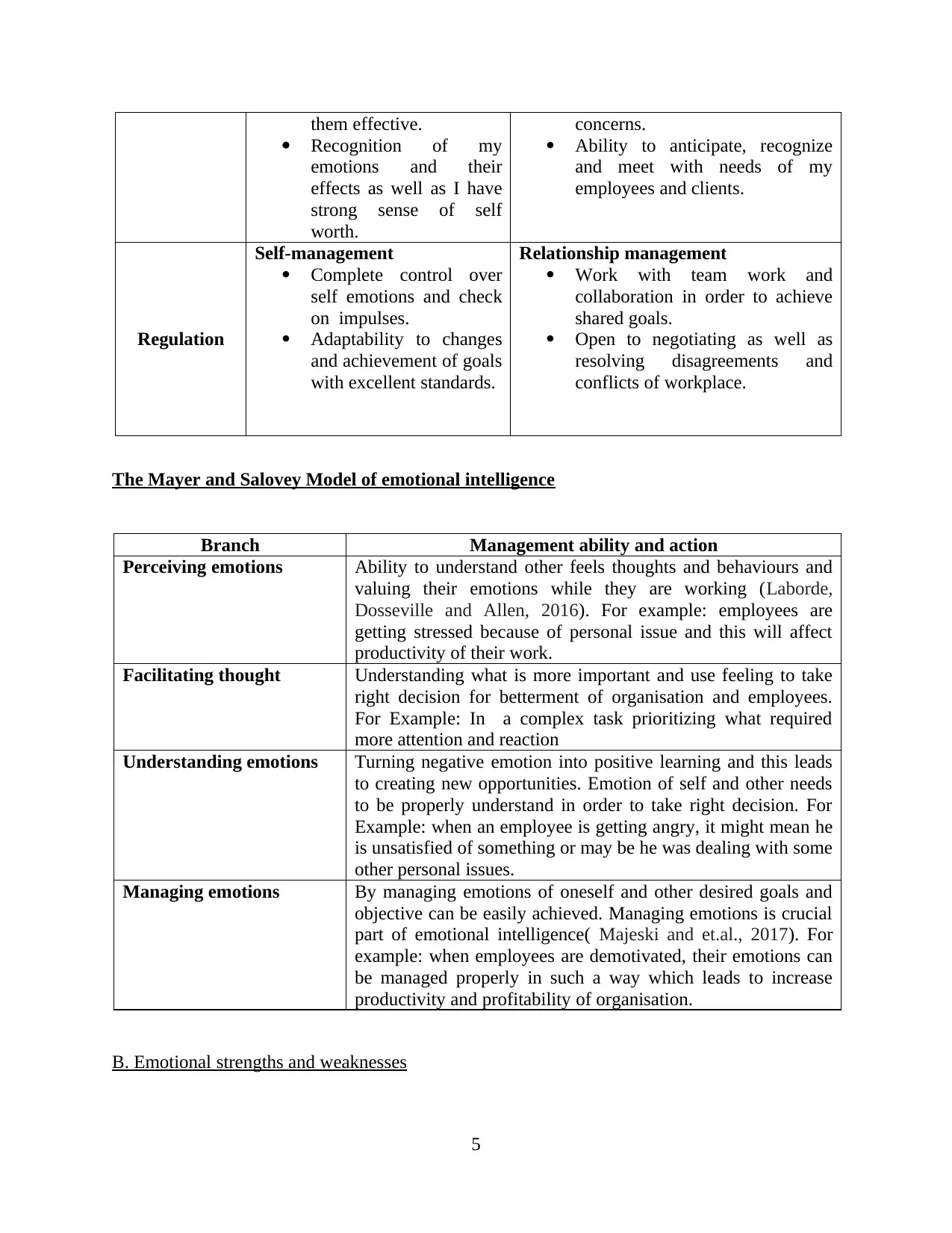
them effective.
Recognition of my
emotions and their
effects as well as I have
strong sense of self
worth.
concerns.
Ability to anticipate, recognize
and meet with needs of my
employees and clients.
Regulation
Self-management
Complete control over
self emotions and check
on impulses.
Adaptability to changes
and achievement of goals
with excellent standards.
Relationship management
Work with team work and
collaboration in order to achieve
shared goals.
Open to negotiating as well as
resolving disagreements and
conflicts of workplace.
The Mayer and Salovey Model of emotional intelligence
Branch Management ability and action
Perceiving emotions Ability to understand other feels thoughts and behaviours and
valuing their emotions while they are working (Laborde,
Dosseville and Allen, 2016). For example: employees are
getting stressed because of personal issue and this will affect
productivity of their work.
Facilitating thought Understanding what is more important and use feeling to take
right decision for betterment of organisation and employees.
For Example: In a complex task prioritizing what required
more attention and reaction
Understanding emotions Turning negative emotion into positive learning and this leads
to creating new opportunities. Emotion of self and other needs
to be properly understand in order to take right decision. For
Example: when an employee is getting angry, it might mean he
is unsatisfied of something or may be he was dealing with some
other personal issues.
Managing emotions By managing emotions of oneself and other desired goals and
objective can be easily achieved. Managing emotions is crucial
part of emotional intelligence( Majeski and et.al., 2017). For
example: when employees are demotivated, their emotions can
be managed properly in such a way which leads to increase
productivity and profitability of organisation.
B. Emotional strengths and weaknesses
5
Recognition of my
emotions and their
effects as well as I have
strong sense of self
worth.
concerns.
Ability to anticipate, recognize
and meet with needs of my
employees and clients.
Regulation
Self-management
Complete control over
self emotions and check
on impulses.
Adaptability to changes
and achievement of goals
with excellent standards.
Relationship management
Work with team work and
collaboration in order to achieve
shared goals.
Open to negotiating as well as
resolving disagreements and
conflicts of workplace.
The Mayer and Salovey Model of emotional intelligence
Branch Management ability and action
Perceiving emotions Ability to understand other feels thoughts and behaviours and
valuing their emotions while they are working (Laborde,
Dosseville and Allen, 2016). For example: employees are
getting stressed because of personal issue and this will affect
productivity of their work.
Facilitating thought Understanding what is more important and use feeling to take
right decision for betterment of organisation and employees.
For Example: In a complex task prioritizing what required
more attention and reaction
Understanding emotions Turning negative emotion into positive learning and this leads
to creating new opportunities. Emotion of self and other needs
to be properly understand in order to take right decision. For
Example: when an employee is getting angry, it might mean he
is unsatisfied of something or may be he was dealing with some
other personal issues.
Managing emotions By managing emotions of oneself and other desired goals and
objective can be easily achieved. Managing emotions is crucial
part of emotional intelligence( Majeski and et.al., 2017). For
example: when employees are demotivated, their emotions can
be managed properly in such a way which leads to increase
productivity and profitability of organisation.
B. Emotional strengths and weaknesses
5
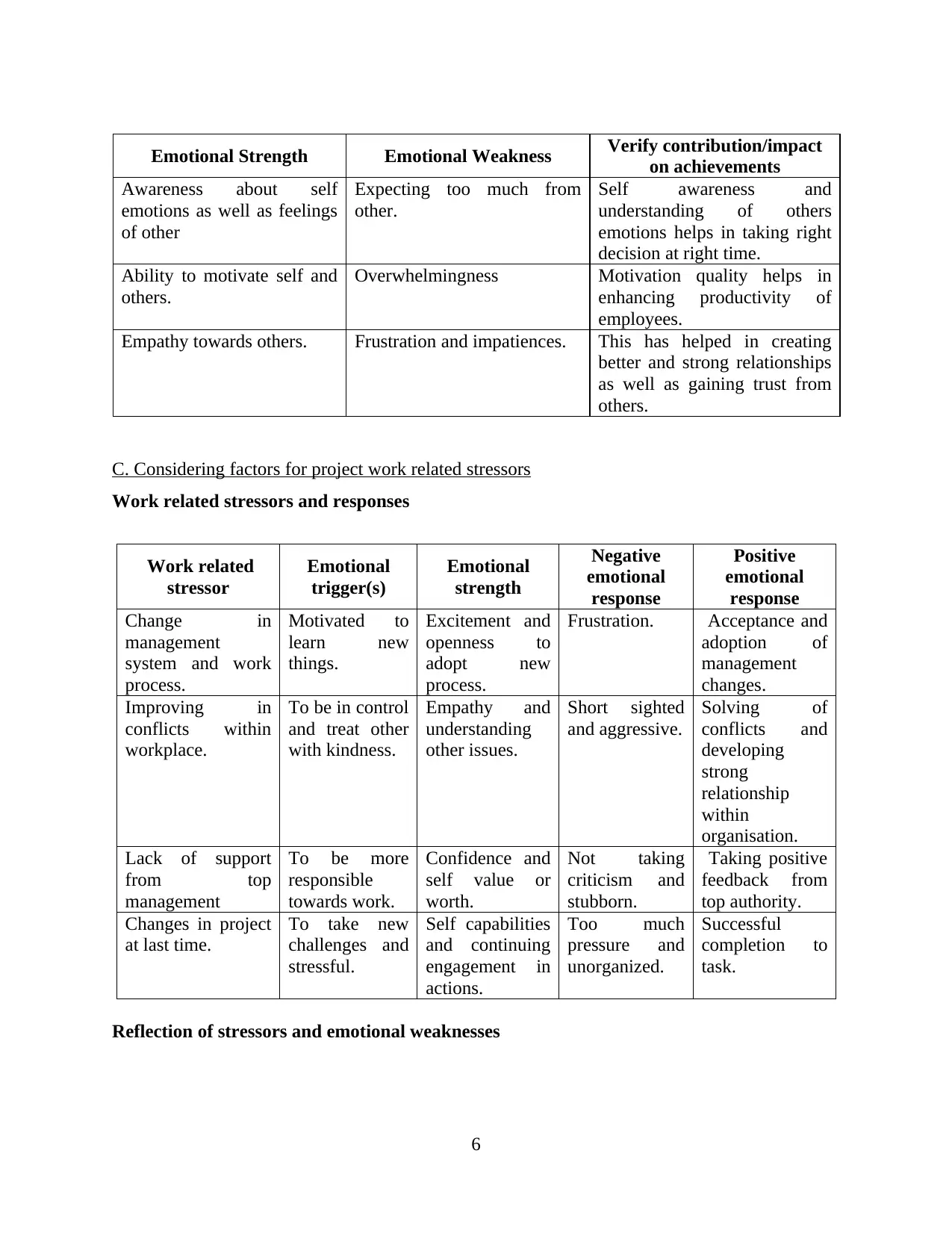
Emotional Strength Emotional Weakness Verify contribution/impact
on achievements
Awareness about self
emotions as well as feelings
of other
Expecting too much from
other.
Self awareness and
understanding of others
emotions helps in taking right
decision at right time.
Ability to motivate self and
others.
Overwhelmingness Motivation quality helps in
enhancing productivity of
employees.
Empathy towards others. Frustration and impatiences. This has helped in creating
better and strong relationships
as well as gaining trust from
others.
C. Considering factors for project work related stressors
Work related stressors and responses
Work related
stressor
Emotional
trigger(s)
Emotional
strength
Negative
emotional
response
Positive
emotional
response
Change in
management
system and work
process.
Motivated to
learn new
things.
Excitement and
openness to
adopt new
process.
Frustration. Acceptance and
adoption of
management
changes.
Improving in
conflicts within
workplace.
To be in control
and treat other
with kindness.
Empathy and
understanding
other issues.
Short sighted
and aggressive.
Solving of
conflicts and
developing
strong
relationship
within
organisation.
Lack of support
from top
management
To be more
responsible
towards work.
Confidence and
self value or
worth.
Not taking
criticism and
stubborn.
Taking positive
feedback from
top authority.
Changes in project
at last time.
To take new
challenges and
stressful.
Self capabilities
and continuing
engagement in
actions.
Too much
pressure and
unorganized.
Successful
completion to
task.
Reflection of stressors and emotional weaknesses
6
on achievements
Awareness about self
emotions as well as feelings
of other
Expecting too much from
other.
Self awareness and
understanding of others
emotions helps in taking right
decision at right time.
Ability to motivate self and
others.
Overwhelmingness Motivation quality helps in
enhancing productivity of
employees.
Empathy towards others. Frustration and impatiences. This has helped in creating
better and strong relationships
as well as gaining trust from
others.
C. Considering factors for project work related stressors
Work related stressors and responses
Work related
stressor
Emotional
trigger(s)
Emotional
strength
Negative
emotional
response
Positive
emotional
response
Change in
management
system and work
process.
Motivated to
learn new
things.
Excitement and
openness to
adopt new
process.
Frustration. Acceptance and
adoption of
management
changes.
Improving in
conflicts within
workplace.
To be in control
and treat other
with kindness.
Empathy and
understanding
other issues.
Short sighted
and aggressive.
Solving of
conflicts and
developing
strong
relationship
within
organisation.
Lack of support
from top
management
To be more
responsible
towards work.
Confidence and
self value or
worth.
Not taking
criticism and
stubborn.
Taking positive
feedback from
top authority.
Changes in project
at last time.
To take new
challenges and
stressful.
Self capabilities
and continuing
engagement in
actions.
Too much
pressure and
unorganized.
Successful
completion to
task.
Reflection of stressors and emotional weaknesses
6
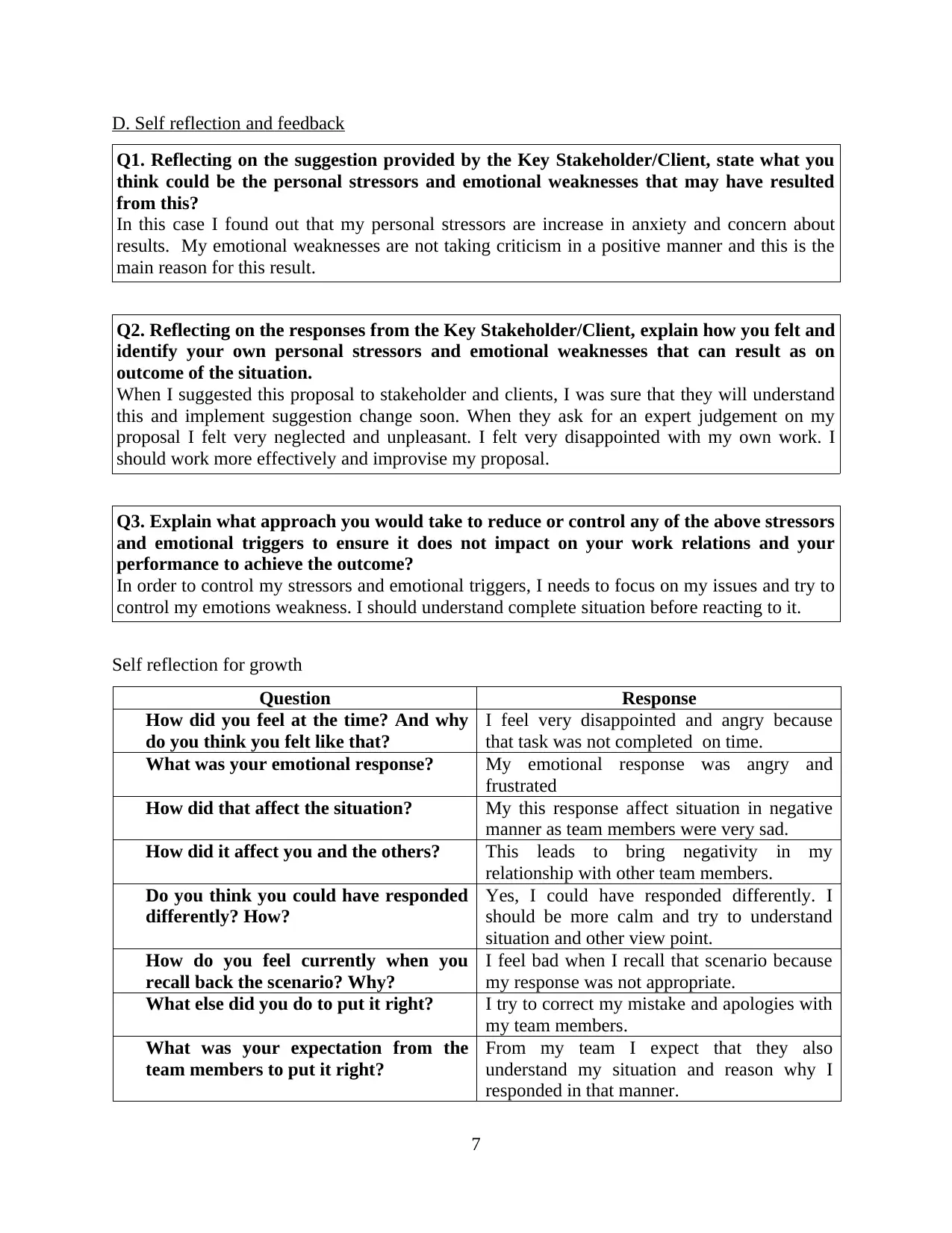
D. Self reflection and feedback
Q1. Reflecting on the suggestion provided by the Key Stakeholder/Client, state what you
think could be the personal stressors and emotional weaknesses that may have resulted
from this?
In this case I found out that my personal stressors are increase in anxiety and concern about
results. My emotional weaknesses are not taking criticism in a positive manner and this is the
main reason for this result.
Q2. Reflecting on the responses from the Key Stakeholder/Client, explain how you felt and
identify your own personal stressors and emotional weaknesses that can result as on
outcome of the situation.
When I suggested this proposal to stakeholder and clients, I was sure that they will understand
this and implement suggestion change soon. When they ask for an expert judgement on my
proposal I felt very neglected and unpleasant. I felt very disappointed with my own work. I
should work more effectively and improvise my proposal.
Q3. Explain what approach you would take to reduce or control any of the above stressors
and emotional triggers to ensure it does not impact on your work relations and your
performance to achieve the outcome?
In order to control my stressors and emotional triggers, I needs to focus on my issues and try to
control my emotions weakness. I should understand complete situation before reacting to it.
Self reflection for growth
Question Response
How did you feel at the time? And why
do you think you felt like that?
I feel very disappointed and angry because
that task was not completed on time.
What was your emotional response? My emotional response was angry and
frustrated
How did that affect the situation? My this response affect situation in negative
manner as team members were very sad.
How did it affect you and the others? This leads to bring negativity in my
relationship with other team members.
Do you think you could have responded
differently? How?
Yes, I could have responded differently. I
should be more calm and try to understand
situation and other view point.
How do you feel currently when you
recall back the scenario? Why?
I feel bad when I recall that scenario because
my response was not appropriate.
What else did you do to put it right? I try to correct my mistake and apologies with
my team members.
What was your expectation from the
team members to put it right?
From my team I expect that they also
understand my situation and reason why I
responded in that manner.
7
Q1. Reflecting on the suggestion provided by the Key Stakeholder/Client, state what you
think could be the personal stressors and emotional weaknesses that may have resulted
from this?
In this case I found out that my personal stressors are increase in anxiety and concern about
results. My emotional weaknesses are not taking criticism in a positive manner and this is the
main reason for this result.
Q2. Reflecting on the responses from the Key Stakeholder/Client, explain how you felt and
identify your own personal stressors and emotional weaknesses that can result as on
outcome of the situation.
When I suggested this proposal to stakeholder and clients, I was sure that they will understand
this and implement suggestion change soon. When they ask for an expert judgement on my
proposal I felt very neglected and unpleasant. I felt very disappointed with my own work. I
should work more effectively and improvise my proposal.
Q3. Explain what approach you would take to reduce or control any of the above stressors
and emotional triggers to ensure it does not impact on your work relations and your
performance to achieve the outcome?
In order to control my stressors and emotional triggers, I needs to focus on my issues and try to
control my emotions weakness. I should understand complete situation before reacting to it.
Self reflection for growth
Question Response
How did you feel at the time? And why
do you think you felt like that?
I feel very disappointed and angry because
that task was not completed on time.
What was your emotional response? My emotional response was angry and
frustrated
How did that affect the situation? My this response affect situation in negative
manner as team members were very sad.
How did it affect you and the others? This leads to bring negativity in my
relationship with other team members.
Do you think you could have responded
differently? How?
Yes, I could have responded differently. I
should be more calm and try to understand
situation and other view point.
How do you feel currently when you
recall back the scenario? Why?
I feel bad when I recall that scenario because
my response was not appropriate.
What else did you do to put it right? I try to correct my mistake and apologies with
my team members.
What was your expectation from the
team members to put it right?
From my team I expect that they also
understand my situation and reason why I
responded in that manner.
7
Secure Best Marks with AI Grader
Need help grading? Try our AI Grader for instant feedback on your assignments.
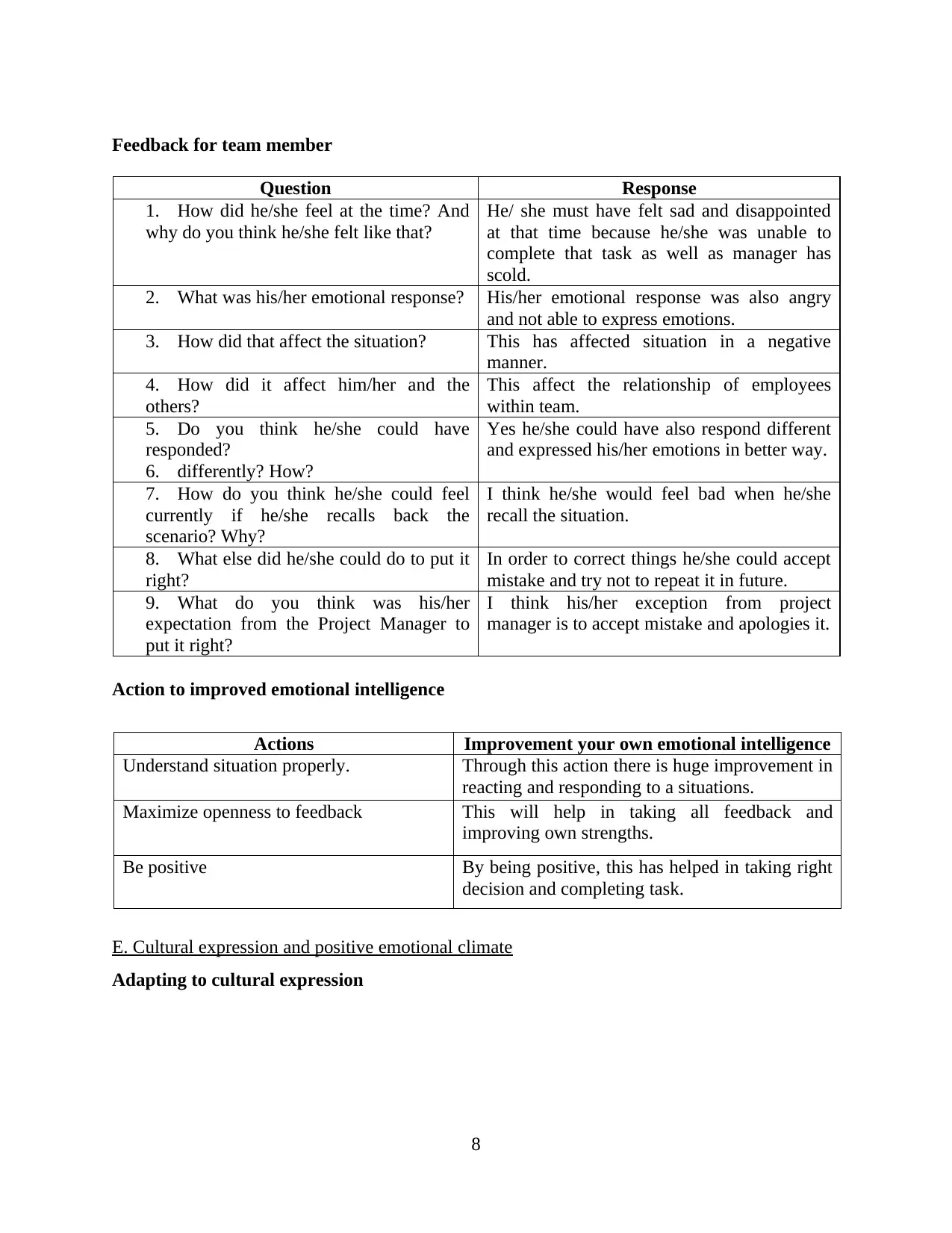
Feedback for team member
Question Response
1. How did he/she feel at the time? And
why do you think he/she felt like that?
He/ she must have felt sad and disappointed
at that time because he/she was unable to
complete that task as well as manager has
scold.
2. What was his/her emotional response? His/her emotional response was also angry
and not able to express emotions.
3. How did that affect the situation? This has affected situation in a negative
manner.
4. How did it affect him/her and the
others?
This affect the relationship of employees
within team.
5. Do you think he/she could have
responded?
6. differently? How?
Yes he/she could have also respond different
and expressed his/her emotions in better way.
7. How do you think he/she could feel
currently if he/she recalls back the
scenario? Why?
I think he/she would feel bad when he/she
recall the situation.
8. What else did he/she could do to put it
right?
In order to correct things he/she could accept
mistake and try not to repeat it in future.
9. What do you think was his/her
expectation from the Project Manager to
put it right?
I think his/her exception from project
manager is to accept mistake and apologies it.
Action to improved emotional intelligence
Actions Improvement your own emotional intelligence
Understand situation properly. Through this action there is huge improvement in
reacting and responding to a situations.
Maximize openness to feedback This will help in taking all feedback and
improving own strengths.
Be positive By being positive, this has helped in taking right
decision and completing task.
E. Cultural expression and positive emotional climate
Adapting to cultural expression
8
Question Response
1. How did he/she feel at the time? And
why do you think he/she felt like that?
He/ she must have felt sad and disappointed
at that time because he/she was unable to
complete that task as well as manager has
scold.
2. What was his/her emotional response? His/her emotional response was also angry
and not able to express emotions.
3. How did that affect the situation? This has affected situation in a negative
manner.
4. How did it affect him/her and the
others?
This affect the relationship of employees
within team.
5. Do you think he/she could have
responded?
6. differently? How?
Yes he/she could have also respond different
and expressed his/her emotions in better way.
7. How do you think he/she could feel
currently if he/she recalls back the
scenario? Why?
I think he/she would feel bad when he/she
recall the situation.
8. What else did he/she could do to put it
right?
In order to correct things he/she could accept
mistake and try not to repeat it in future.
9. What do you think was his/her
expectation from the Project Manager to
put it right?
I think his/her exception from project
manager is to accept mistake and apologies it.
Action to improved emotional intelligence
Actions Improvement your own emotional intelligence
Understand situation properly. Through this action there is huge improvement in
reacting and responding to a situations.
Maximize openness to feedback This will help in taking all feedback and
improving own strengths.
Be positive By being positive, this has helped in taking right
decision and completing task.
E. Cultural expression and positive emotional climate
Adapting to cultural expression
8
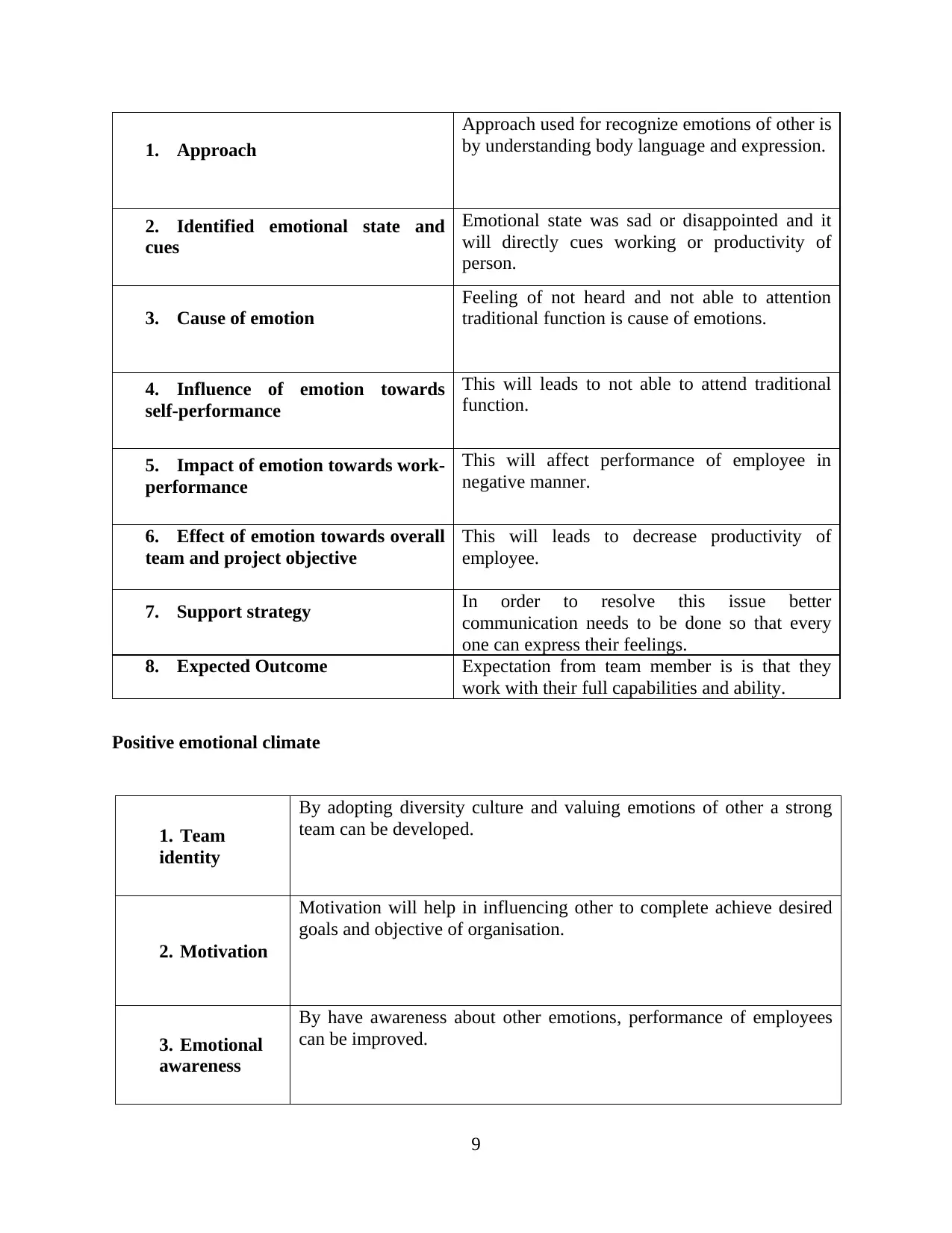
1. Approach
Approach used for recognize emotions of other is
by understanding body language and expression.
2. Identified emotional state and
cues
Emotional state was sad or disappointed and it
will directly cues working or productivity of
person.
3. Cause of emotion
Feeling of not heard and not able to attention
traditional function is cause of emotions.
4. Influence of emotion towards
self-performance
This will leads to not able to attend traditional
function.
5. Impact of emotion towards work-
performance
This will affect performance of employee in
negative manner.
6. Effect of emotion towards overall
team and project objective
This will leads to decrease productivity of
employee.
7. Support strategy In order to resolve this issue better
communication needs to be done so that every
one can express their feelings.
8. Expected Outcome Expectation from team member is is that they
work with their full capabilities and ability.
Positive emotional climate
1. Team
identity
By adopting diversity culture and valuing emotions of other a strong
team can be developed.
2. Motivation
Motivation will help in influencing other to complete achieve desired
goals and objective of organisation.
3. Emotional
awareness
By have awareness about other emotions, performance of employees
can be improved.
9
Approach used for recognize emotions of other is
by understanding body language and expression.
2. Identified emotional state and
cues
Emotional state was sad or disappointed and it
will directly cues working or productivity of
person.
3. Cause of emotion
Feeling of not heard and not able to attention
traditional function is cause of emotions.
4. Influence of emotion towards
self-performance
This will leads to not able to attend traditional
function.
5. Impact of emotion towards work-
performance
This will affect performance of employee in
negative manner.
6. Effect of emotion towards overall
team and project objective
This will leads to decrease productivity of
employee.
7. Support strategy In order to resolve this issue better
communication needs to be done so that every
one can express their feelings.
8. Expected Outcome Expectation from team member is is that they
work with their full capabilities and ability.
Positive emotional climate
1. Team
identity
By adopting diversity culture and valuing emotions of other a strong
team can be developed.
2. Motivation
Motivation will help in influencing other to complete achieve desired
goals and objective of organisation.
3. Emotional
awareness
By have awareness about other emotions, performance of employees
can be improved.
9
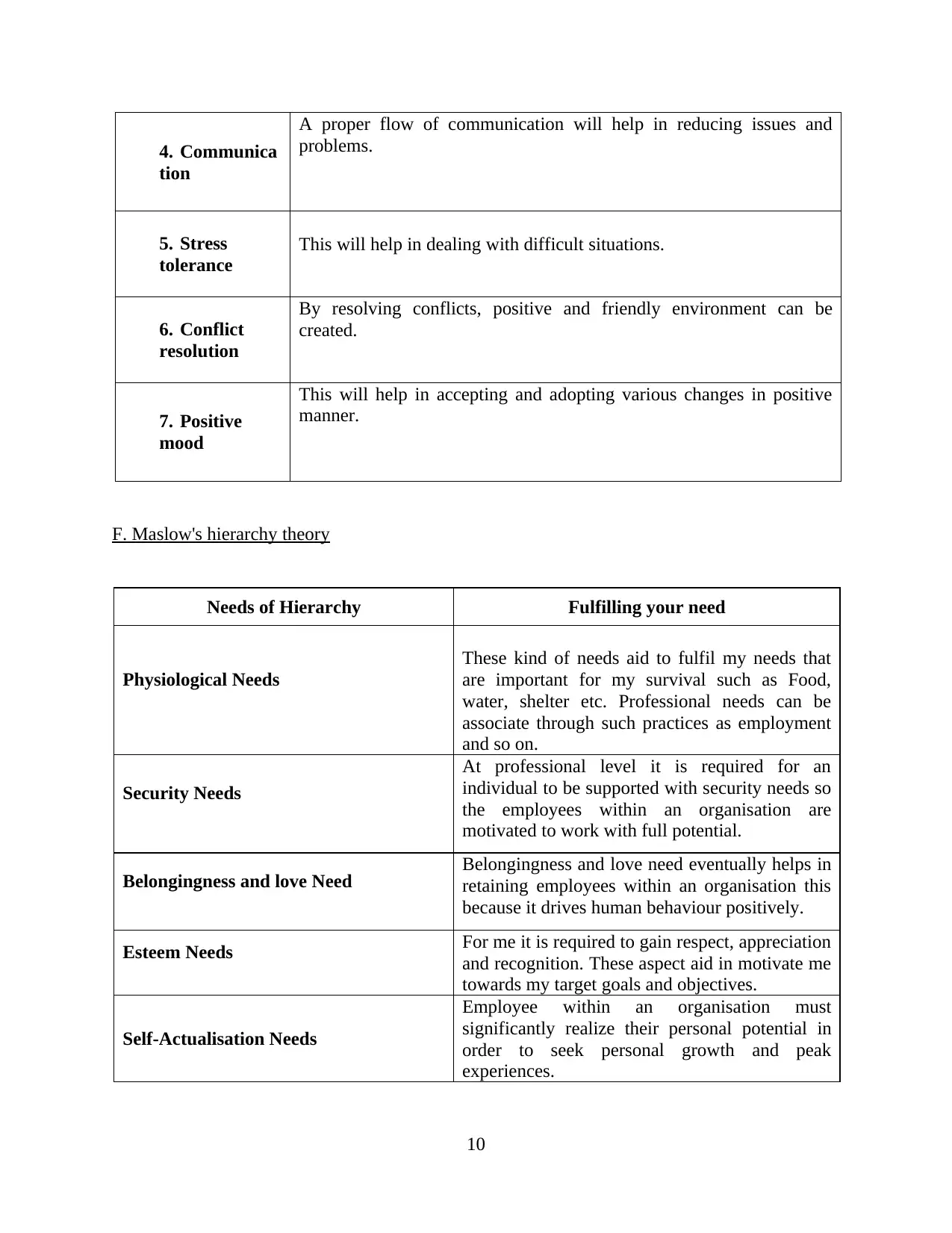
4. Communica
tion
A proper flow of communication will help in reducing issues and
problems.
5. Stress
tolerance
This will help in dealing with difficult situations.
6. Conflict
resolution
By resolving conflicts, positive and friendly environment can be
created.
7. Positive
mood
This will help in accepting and adopting various changes in positive
manner.
F. Maslow's hierarchy theory
Needs of Hierarchy Fulfilling your need
Physiological Needs
These kind of needs aid to fulfil my needs that
are important for my survival such as Food,
water, shelter etc. Professional needs can be
associate through such practices as employment
and so on.
Security Needs
At professional level it is required for an
individual to be supported with security needs so
the employees within an organisation are
motivated to work with full potential.
Belongingness and love Need Belongingness and love need eventually helps in
retaining employees within an organisation this
because it drives human behaviour positively.
Esteem Needs For me it is required to gain respect, appreciation
and recognition. These aspect aid in motivate me
towards my target goals and objectives.
Self-Actualisation Needs
Employee within an organisation must
significantly realize their personal potential in
order to seek personal growth and peak
experiences.
10
tion
A proper flow of communication will help in reducing issues and
problems.
5. Stress
tolerance
This will help in dealing with difficult situations.
6. Conflict
resolution
By resolving conflicts, positive and friendly environment can be
created.
7. Positive
mood
This will help in accepting and adopting various changes in positive
manner.
F. Maslow's hierarchy theory
Needs of Hierarchy Fulfilling your need
Physiological Needs
These kind of needs aid to fulfil my needs that
are important for my survival such as Food,
water, shelter etc. Professional needs can be
associate through such practices as employment
and so on.
Security Needs
At professional level it is required for an
individual to be supported with security needs so
the employees within an organisation are
motivated to work with full potential.
Belongingness and love Need Belongingness and love need eventually helps in
retaining employees within an organisation this
because it drives human behaviour positively.
Esteem Needs For me it is required to gain respect, appreciation
and recognition. These aspect aid in motivate me
towards my target goals and objectives.
Self-Actualisation Needs
Employee within an organisation must
significantly realize their personal potential in
order to seek personal growth and peak
experiences.
10
Paraphrase This Document
Need a fresh take? Get an instant paraphrase of this document with our AI Paraphraser
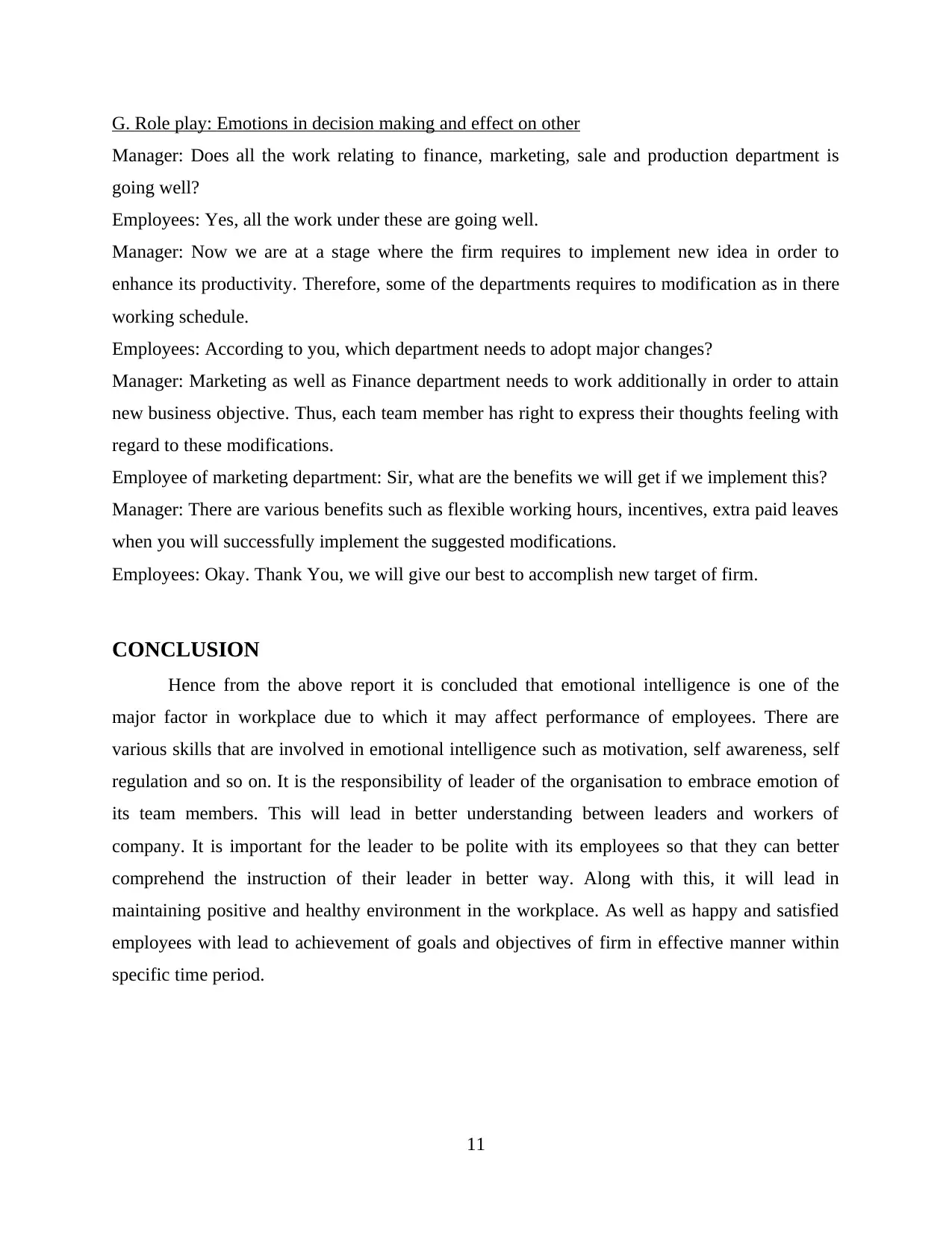
G. Role play: Emotions in decision making and effect on other
Manager: Does all the work relating to finance, marketing, sale and production department is
going well?
Employees: Yes, all the work under these are going well.
Manager: Now we are at a stage where the firm requires to implement new idea in order to
enhance its productivity. Therefore, some of the departments requires to modification as in there
working schedule.
Employees: According to you, which department needs to adopt major changes?
Manager: Marketing as well as Finance department needs to work additionally in order to attain
new business objective. Thus, each team member has right to express their thoughts feeling with
regard to these modifications.
Employee of marketing department: Sir, what are the benefits we will get if we implement this?
Manager: There are various benefits such as flexible working hours, incentives, extra paid leaves
when you will successfully implement the suggested modifications.
Employees: Okay. Thank You, we will give our best to accomplish new target of firm.
CONCLUSION
Hence from the above report it is concluded that emotional intelligence is one of the
major factor in workplace due to which it may affect performance of employees. There are
various skills that are involved in emotional intelligence such as motivation, self awareness, self
regulation and so on. It is the responsibility of leader of the organisation to embrace emotion of
its team members. This will lead in better understanding between leaders and workers of
company. It is important for the leader to be polite with its employees so that they can better
comprehend the instruction of their leader in better way. Along with this, it will lead in
maintaining positive and healthy environment in the workplace. As well as happy and satisfied
employees with lead to achievement of goals and objectives of firm in effective manner within
specific time period.
11
Manager: Does all the work relating to finance, marketing, sale and production department is
going well?
Employees: Yes, all the work under these are going well.
Manager: Now we are at a stage where the firm requires to implement new idea in order to
enhance its productivity. Therefore, some of the departments requires to modification as in there
working schedule.
Employees: According to you, which department needs to adopt major changes?
Manager: Marketing as well as Finance department needs to work additionally in order to attain
new business objective. Thus, each team member has right to express their thoughts feeling with
regard to these modifications.
Employee of marketing department: Sir, what are the benefits we will get if we implement this?
Manager: There are various benefits such as flexible working hours, incentives, extra paid leaves
when you will successfully implement the suggested modifications.
Employees: Okay. Thank You, we will give our best to accomplish new target of firm.
CONCLUSION
Hence from the above report it is concluded that emotional intelligence is one of the
major factor in workplace due to which it may affect performance of employees. There are
various skills that are involved in emotional intelligence such as motivation, self awareness, self
regulation and so on. It is the responsibility of leader of the organisation to embrace emotion of
its team members. This will lead in better understanding between leaders and workers of
company. It is important for the leader to be polite with its employees so that they can better
comprehend the instruction of their leader in better way. Along with this, it will lead in
maintaining positive and healthy environment in the workplace. As well as happy and satisfied
employees with lead to achievement of goals and objectives of firm in effective manner within
specific time period.
11
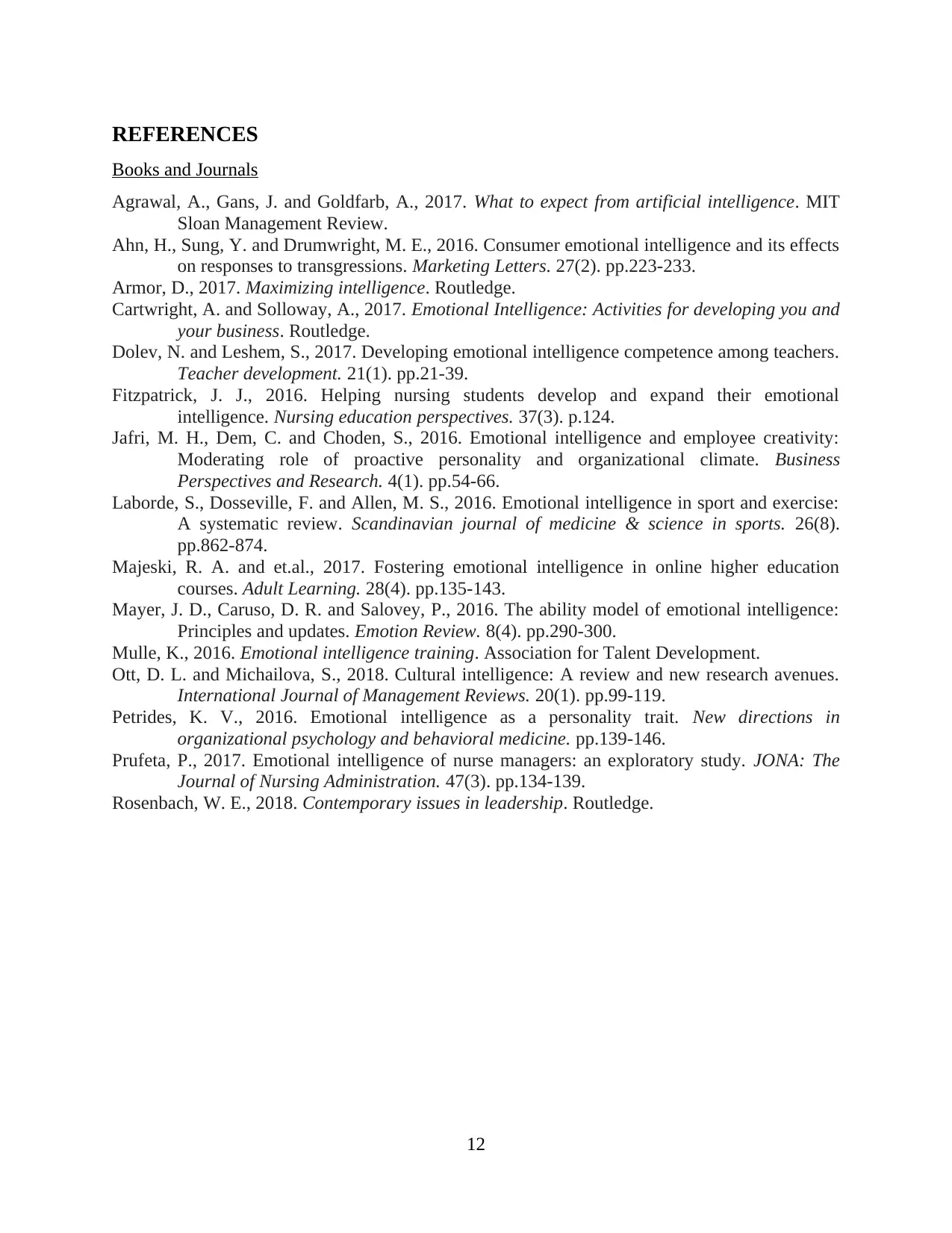
REFERENCES
Books and Journals
Agrawal, A., Gans, J. and Goldfarb, A., 2017. What to expect from artificial intelligence. MIT
Sloan Management Review.
Ahn, H., Sung, Y. and Drumwright, M. E., 2016. Consumer emotional intelligence and its effects
on responses to transgressions. Marketing Letters. 27(2). pp.223-233.
Armor, D., 2017. Maximizing intelligence. Routledge.
Cartwright, A. and Solloway, A., 2017. Emotional Intelligence: Activities for developing you and
your business. Routledge.
Dolev, N. and Leshem, S., 2017. Developing emotional intelligence competence among teachers.
Teacher development. 21(1). pp.21-39.
Fitzpatrick, J. J., 2016. Helping nursing students develop and expand their emotional
intelligence. Nursing education perspectives. 37(3). p.124.
Jafri, M. H., Dem, C. and Choden, S., 2016. Emotional intelligence and employee creativity:
Moderating role of proactive personality and organizational climate. Business
Perspectives and Research. 4(1). pp.54-66.
Laborde, S., Dosseville, F. and Allen, M. S., 2016. Emotional intelligence in sport and exercise:
A systematic review. Scandinavian journal of medicine & science in sports. 26(8).
pp.862-874.
Majeski, R. A. and et.al., 2017. Fostering emotional intelligence in online higher education
courses. Adult Learning. 28(4). pp.135-143.
Mayer, J. D., Caruso, D. R. and Salovey, P., 2016. The ability model of emotional intelligence:
Principles and updates. Emotion Review. 8(4). pp.290-300.
Mulle, K., 2016. Emotional intelligence training. Association for Talent Development.
Ott, D. L. and Michailova, S., 2018. Cultural intelligence: A review and new research avenues.
International Journal of Management Reviews. 20(1). pp.99-119.
Petrides, K. V., 2016. Emotional intelligence as a personality trait. New directions in
organizational psychology and behavioral medicine. pp.139-146.
Prufeta, P., 2017. Emotional intelligence of nurse managers: an exploratory study. JONA: The
Journal of Nursing Administration. 47(3). pp.134-139.
Rosenbach, W. E., 2018. Contemporary issues in leadership. Routledge.
12
Books and Journals
Agrawal, A., Gans, J. and Goldfarb, A., 2017. What to expect from artificial intelligence. MIT
Sloan Management Review.
Ahn, H., Sung, Y. and Drumwright, M. E., 2016. Consumer emotional intelligence and its effects
on responses to transgressions. Marketing Letters. 27(2). pp.223-233.
Armor, D., 2017. Maximizing intelligence. Routledge.
Cartwright, A. and Solloway, A., 2017. Emotional Intelligence: Activities for developing you and
your business. Routledge.
Dolev, N. and Leshem, S., 2017. Developing emotional intelligence competence among teachers.
Teacher development. 21(1). pp.21-39.
Fitzpatrick, J. J., 2016. Helping nursing students develop and expand their emotional
intelligence. Nursing education perspectives. 37(3). p.124.
Jafri, M. H., Dem, C. and Choden, S., 2016. Emotional intelligence and employee creativity:
Moderating role of proactive personality and organizational climate. Business
Perspectives and Research. 4(1). pp.54-66.
Laborde, S., Dosseville, F. and Allen, M. S., 2016. Emotional intelligence in sport and exercise:
A systematic review. Scandinavian journal of medicine & science in sports. 26(8).
pp.862-874.
Majeski, R. A. and et.al., 2017. Fostering emotional intelligence in online higher education
courses. Adult Learning. 28(4). pp.135-143.
Mayer, J. D., Caruso, D. R. and Salovey, P., 2016. The ability model of emotional intelligence:
Principles and updates. Emotion Review. 8(4). pp.290-300.
Mulle, K., 2016. Emotional intelligence training. Association for Talent Development.
Ott, D. L. and Michailova, S., 2018. Cultural intelligence: A review and new research avenues.
International Journal of Management Reviews. 20(1). pp.99-119.
Petrides, K. V., 2016. Emotional intelligence as a personality trait. New directions in
organizational psychology and behavioral medicine. pp.139-146.
Prufeta, P., 2017. Emotional intelligence of nurse managers: an exploratory study. JONA: The
Journal of Nursing Administration. 47(3). pp.134-139.
Rosenbach, W. E., 2018. Contemporary issues in leadership. Routledge.
12
1 out of 15
Related Documents
Your All-in-One AI-Powered Toolkit for Academic Success.
+13062052269
info@desklib.com
Available 24*7 on WhatsApp / Email
![[object Object]](/_next/static/media/star-bottom.7253800d.svg)
Unlock your academic potential
© 2024 | Zucol Services PVT LTD | All rights reserved.





